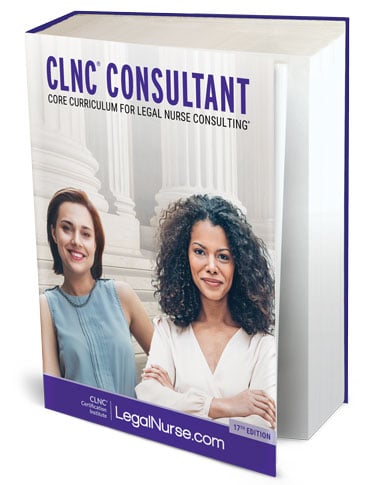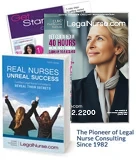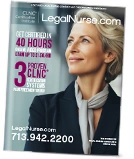Legal Nurse Consultant Certification Core Curriculum
LegalNurse.com’s legal nurse consulting certification core curriculum is the most advanced program for registered nurses in the industry. The 799-pages of the Core Curriculum for Legal Nurse Consulting® textbook set the standard for comprehensive, professional training in the legal nurse consulting field.
Developed and taught by the pioneer of legal nurse consulting, LegalNurse.com’s CLNC® Certification Program covers seventeen extensive modules. You can read our entire certification curriculum below and we invite you to preview Module 1: The Role of the Certified Legal Nurse Consultant for free here.

I liked the idea that I was not in this by myself. Everything you need is addressed. It’s all there for you, and you can go over and over it again. It’s not like going to a university where you take a number, take a seat. This is a family. This is a home.
RN, MSN, CLNC
California
Below is the complete overview of the most comprehensive legal nurse consulting curriculum in the industry:
Module 1 – The Role of the Certified Legal Nurse Consultant
- Seven Types of Cases on Which Certified Legal Nurse Consultants Are Qualified to Consult
- Distinctions Between the Testifying Expert and the Consulting Expert
- Scope of Practice of the CLNC Consultant
Module 2 – The Litigation Process
- The Pre-Litigation Phase of a Lawsuit
- Notice Letters
- Filing the Suit
- Motions and Pretrial Hearings
- Discovery
- Pretrial Conference
- Mock Trial
- Peace Negotiations – ADR
- Trial Preparation
- Trial
- Cleaning Up Afterwards – Posttrial Maneuvers
- The Last Encore – Appeal
- Variables Affecting Who Wins
- Class Action Lawsuits
- Tort Reform
- Conclusion
Module 3 – Theories of Liability and Defenses Used in Medical-Related Cases
- Intentional Tort
- Negligence
- Strict Liability
- Implied Warranties of Merchantability and Fitness
- Representation
Module 4 – Anatomy of Personal Injury, Products Liability, Toxic Tort and Workers’ Compensation Cases
- General Personal Injury and Medical Malpractice
- Products Liability
- Toxic Tort Cases
- Work-Related Injuries
Module 5 – How to Screen Medical-Related Cases Effectively and Efficiently
- Introduction
- Persons Who Screen Medical-Related Cases
- Factors That Affect Initial Screening Opinions of Attorneys and Insurance Companies
- What Certified Legal Nurse Consultants Need to Screen a Case
- Potential Defendants
- Principles of Screening
- Case Screening Form
- How to Use the Screening Form
- Model for Communicating the Screening Opinion
- Plaintiff Alert Situations
- Cases Plaintiff Attorneys Frequently Reject
- Case Evaluation Workshop
Module 6 – Comprehensive Case Evaluation Strategies and Report Writing Techniques
- 21 Steps for Evaluating Medical-Related Cases Effectively
- Introduction to Report Writing
- Report Formats for Brief → Comprehensive Reports
- Components of the Report for Consulting Experts and Testifying Experts
- Principles of Report Writing
- Plaintiff Deviations Used in Medical Malpractice Cases
- Submitting the Report
Module 7 – How to Research Medical-Related Cases
- Getting Started – The Basics
- Selecting the Best Sources of Information
- Search Results and Search Strategies
- Databases and Other Resources
- Database Vendors and Selection
- Information Brokers
- Document Delivery
- Citing Literature and Internet References in Reports
- Conclusion
Module 8 – Standards of Care
- Defining Standards of Care – What They Are and Why They Are Used
- Sources Indicative of Standards of Care
- Obtaining Standards and Guidelines
- How Attorneys Use Standards of Care in the Courtroom
- Implications of Standards for Plaintiff and Defense Clients
- Common Defenses Related to SOC
- Analyzing Policies and Procedures of the Defendant Healthcare Facility
Module 9 – Helping Attorneys with Discovery
- Guidelines for Drafting Discovery
- Types of Interrogatories Directed to Defendants
- Types of Requests for Production Directed to Defendants
- Types of Interrogatories Directed to Plaintiffs
- Types of Requests for Production Directed to Plaintiffs
Module 10 – Helping Attorneys Develop Demonstrative Evidence
- Definitions
- Purpose of Demonstrative Evidence
- Media Used for Demonstrative Evidence
- Principles of Conceptualizing and Developing Demonstrative Evidence
- Working with a Graphics Consultant
- Admissibility of Demonstrative Evidence
Module 11 – The Role of the Nurse as a Testifying Expert
- Testimony by Expert Witnesses
- Who Testifies and Why
- Getting Hired as a Testifying Expert
- Communicating Skillfully with Your Attorney-Client
- Preparing for Deposition and Trial
- Your Testifying Experience
- Powerful Testifying Strategies for Testifying Experts and Nurse Witnesses
Module 12 – Locating and Working with Testifying Experts
- Benefits to the Legal Community
- Assessing Qualifications of Potential Testifying Experts
- Sources for Locating Testifying Experts
- Brokering Testifying Experts for Law Firms
- Working Effectively with Testifying Experts
- Types of Testifying Experts Used in Medical-Related Cases
- Fees for Locating Expert Witnesses
Module 13 – How to Formulate and Negotiate Contracts
- Contracts
- The Seven Major Parts of a Contract
- Contract Negotiation Strategies
- Contract Drafting Strategies
Module 14 – Legal and Ethical Issues
- Liability Issues
- Conflicts of Interest
- Confidentiality
Module 15 – Developing a Marketing Strategy
- Four Elements of Effective Marketing
- Plan in Advance for Your Success
- Build Strong Attorney-Client Relationships by Committing to Quality, Excellence and Service
- Create and Project a Winning Brand and Image
- Implement Relevant and Effective Marketing Strategies
Module 16 – Successful Interview Strategies
- Self-Assessment
- Interview Preparation
- Strategies for a Successful Interview
- Common Attorney Interview Questions
- Turn Objections into Opportunities
- Close the Sale
- Evaluate Your Performance
Module 17 – Business Development Principles
- Setting Up and Managing Your CLNC Business for Profitability
- Professional Services and Resources You’ll Need
- Choosing the Right Business Structure
- Office Space
- Office Equipment and Furniture
- Tax Deductible Items
- Information Management, Storage and Retrieval
- Expanding Your CLNC Business Through CLNC Subcontractors
- Business Management Strategies
- Negotiating Your Fee to Earn What You Are Worth
- Billing
- Collection – Making Sure You Get Paid on Time





